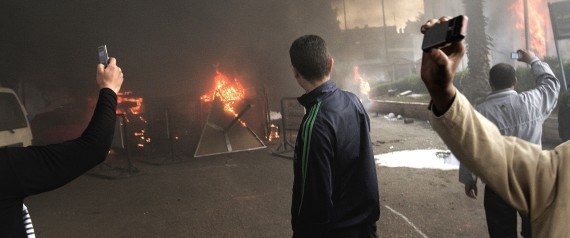Friday, January 28, 2011
Can a country shut down the internet entirely?
Isn't the internet the one form of media that can cross national borders and elude the control of various governments throughout the world? Isn't the internet the true space of civil society that allows anyone, regardless of their levels of power, to be able to voice their opinions, share their messages, and receive information freely?
Apparently not, as the government of besieged President Hosni Mubarak has this week achieved what seems to be unprecedented, even for regimes like China. With his administration under internal political attack by young dissidents (a generation that relies heavily on social and internet-based media), Mubarak has shut down the internet and mobile phone service in Egypt.
The internet monitoring firm Renesys calls these actions "unprecedented in Internet history," indicating what others label "a level of governmental Internet control unseen to this point, not even in China, Iran and Tunisia, which have been accused of manipulating Internet access to quell government opposition." Mubarak has digitally sealed Egypt off from the rest of the world, according to articles in Scientific American and The Huffington Post that explain the technical methods used to do so.
It appears the the Egyptian government and its security forces have been able to shut down internet and mobile communication services by shutting down routers of individuals internet service providers (ISP's) and withdrawing Border Gateway Protocol (BGP) routes by Egyptian ISPs, effectively blocking the majority of both incoming and outgoing internet traffic. According to a PCWorld article, satellite communications may be the only chink in Mubarak's digital armor.
Twitter was the first social media platform to be blocked on Tuesday, just three days ago, as the civil unrest, fueled by social media communication, became more intense. This was not unprecedented; China, for example, had blocked Twitter in July 2009 during the ethnic unrest in Urumqi in Xinjiang Province. Authorities in these totalitarian states fear both the ability of social media like Twitter to mobilize an even larger protest group as well as their ability to spread reports and images of protests and police actions throughout the world.
Al Jazeera was able to post some photos of the demonstrations on Flickr, taken 25th and 26th of January, which appear to be mobile phone camera images.
Moments ago, Mubarak gave a speech announcing that he was removing his cabinet ministers. According to an excellent live news coverage feed on BBC News Online, covering the speech:
The recent protests wouldn't have been possible without the introduction in Egypt of civil and media liberties, says Mr Mubarak. While he takes the side of citizens' freedom to express their views, he also wants to defend Egypt's stability. "There is a fine line between freedom and chaos," he says.
The best news report I've seen on this is from Democracy Now:
Subscribe to:
Post Comments (Atom)




I wonder what is happening to Egyptian companies that rely solely on their websites for business purposes?
ReplyDeleteGood question! I just saw an article that said "Egypt's government must return Internet access to the country by Monday or perhaps suffer massive economic damage, as banks and other economic institutions return to work without the ability to conduct commerce." see http://technolog.msnbc.msn.com/_news/2011/01/28/5942650-net-less-egypt-may-face-economic-doom-monday
ReplyDelete